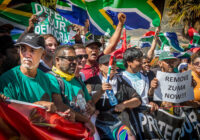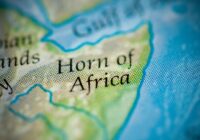Black Panther makes sense for black Americans who have never stayed long in Africa, people who want a Marvel Comic of their own.
Since 1979, I have wandered and worked all over Africa. That work has been in the slums of great cities, innumerable war zones, universities, amidst spectacular natural beauty, and with wonderful people. I have worked with liberation movements and opposition leaders as well as with prime ministers and generals, and have advised African delegations negotiating with Beijing and ministers meeting the IMF.
As such, I was totally bemused by the film Black Panther. It was a fun film. Some adrenalin got pumping. The female warriors did good spear work — although it was Okinawan and Chinese spear work — and the Argentinian scenery was fantastic. But how do you reimagine Africa from the basis of this film? Maybe it makes sense for black Americans who have never stayed long in Africa, people who want a Marvel Comic of their own. But being black is not being African. Reimagining blackness is not reimagining Africa. A comic is a comic. Black Panther is wonderful, but trivial.
I have followed the argument on race politics in America between Ta-Nehisi Coates and Cornel West. West was once a great philosopher — his work on philosophic pragmatism was astounding — but has produced no scholarly breakthrough for some time. He asserts that the fractures of society have more to them than the dispossessed being simply black. Coates was, of course, the writer of the Black Panther Marvel Comic, as well as an extremely thoughtful journalist. But the film of his comic makes of African blackness an undifferentiated mishmash that, all the same, underwrites precisely West’s point that economics, leverage and power, strategies of cooperation and confrontation, and global structures all have something to do with race relations and, in the case of the film, international relations.
Mishmash
Black Panther a mish-mash despite its effort to use African language. Xhosa, a widespread language in South Africa, known for its clicks, is spoken well in the film. Except that, suddenly, from time to time, a Swahili word or phrase suddenly intrudes. That’s careless and lazy, like mixing a bit of Finnish with Greek and claiming it’s all European.
But perhaps the Swahili is a useful pointer as, in fact, there actually aren’t too many black panthers in Africa. Outside South America, where they are members of the jaguar species, panthers are black leopards that live mostly in Asia, with small populations in Ethiopia and Kenya. Kenya is one of the Eastern African countries where Swahili is spoken, as it is in minority parts of Ethiopia. But no black panther has ever existed in South Africa where Xhosa is spoken. Ancestors who speak Xhosa and who have the powers of a panther are gobbledygook. Apart from the color, black jaguars and black leopards are very different. The panthers glimpsed in the film are jaguars — South American.
The idea of a hidden mountain kingdom in South Africa immediately resonates with the fact that Lesotho is exactly a largely unknown such kingdom. I kept scanning the Argentinian landscape hoping it was in fact Lesotho, a country of great but devastated beauty; but in Lesotho they speak Sesotho, which is not Xhosa by a long shot.
Do It Yourself
Wakanda is most reminiscent of the El Dorado of the dreams of Spanish imperialists. In fact, the whole of the film resonates with the tropes of imperialism, from which Wakanda has supposedly freed itself. But the very name, Wakanda, was first used by Edgar Rice Burroughs, the inventor of Tarzan — very like a Marvel character — who hardly represented an accurate picture of Africa. The Ghost Who Walks, the Panther Who Walks — the parallels are unflattering.
But the capital of Wakanda is indeed a hidden El Dorado, not of gold, but of technology, based on the fictional mineral, vibranium. To be fair, vibranium keeps popping up in a range of Marvel Comics, but it has two chief characteristics in Black Panther. Firstly, every single technology achieved by this African state owes to vibranium; without it they are reduced to nothing. With it, Wakanda is great — suggesting people got lucky in the foundation of their development. Secondly, the Wakandan scientists beneficiated (processed and manufactured it from its raw state) it themselves.
This is the absolute key point of the film, and it is a very good one. And it is the key point of Cornel West. Much of Africa’s underdevelopment is because multi-national mining corporations extract the continent’s minerals and raw materials, but then they beneficiate it and make huge profits from the manufactured product, and none of the profit from that comes back to Africa. The African state that develops the industrial capacity to achieve the manufacture of its raw materials will become much richer than the one that simply sells its assets raw.
But huge industrial combines seek to keep manufacture in the USA, in Europe, in China. Jobs and economies depend on it. When Middle Eastern countries began refining their own oil, it caused a huge outcry. That was the prerogative of Exxon Mobil and the rest of what were then called the Seven Sisters — all Western corporations. That protected black workers in the West as well.
If the take-home from Black Panther is that you’ve got to do it yourself, it is a wonderful take-home. But industries and their workers will indeed suffer elsewhere. That is why neither right nor left, corporations nor trade unions, bosses nor workers want an industrialized Africa.
If, by some wonderful movie-magic chance, all the new African industries could be ecologically clean, that would be a fantasy come true. But industrialization is messy, as China has shown. And 55 separate African countries are not going to come up with a common industrial and environmental platform and policy. And, as the US withdraws from the Paris Climate Agreement, why should it? If the US doesn’t care for the environment, why should Africa?
You Have to Dream
All these things are left unexplored in the film. Equality is going to be messy. Not in the conquest of former imperialism as advocated by Killmonger in the film, but in getting the total act together.
But the film is a fantasy. It’s science fiction. I am too hard on it. You have to dream. And it has to be a dream that plugs into other dreams in the dreaming cinematic world and its associated media.
So it’s no surprise that the film’s Korean nightclub scene is a direct lift from Casino Royale, with white CIA agent Ross playing the part of black CIA agent Felix Leiter in the James Bond archetype. What I liked in Black Panther is that Ross becomes the true caricature. He has to be taught everything. He becomes a comic character, an inversion in racial stereotypes of Eddie Murphy’s jiving black cop; only Ross, while certainly brave, is essentially an idiot.
The Korean car chase again echoes almost every James Bond and Jason Bourne film. I kept looking for the Italian suits from John Wicks. But that’s the subtext perhaps: Africa is the melting pot of the future. It will absorb everything we throw at it and rise into something very great but not currently recognizable. In this, imagination and reimagination are great things.
But we should perhaps imagine a little more boldly, more dramatically. Remember, before the imperial powers formally colonized Africa in 1884 at the Congress of Berlin, they had imposed two great Opium Wars on China from 1839 to 1860. The effort to turn China into a nation of drug addicts and force international trade onto the country on European terms was as racially charged as the crimes against Africa. The Chinese called it their “century of humiliation.” Did China emerge by yellowness? Would that have been enough? It imagined itself as greater and more complex than anything China had ever been before.
That, I hope, will be the imagination behind the new Africa.
The views expressed in this article are the author’s own and do not necessarily reflect Fair Observer’s editorial policy.
Photo Credit: Panacea Doll / Shutterstock.com
Support Fair Observer
We rely on your support for our independence, diversity and quality.
For more than 10 years, Fair Observer has been free, fair and independent. No billionaire owns us, no advertisers control us. We are a reader-supported nonprofit. Unlike many other publications, we keep our content free for readers regardless of where they live or whether they can afford to pay. We have no paywalls and no ads.
In the post-truth era of fake news, echo chambers and filter bubbles, we publish a plurality of perspectives from around the world. Anyone can publish with us, but everyone goes through a rigorous editorial process. So, you get fact-checked, well-reasoned content instead of noise.
We publish 2,500+ voices from 90+ countries. We also conduct education and training programs
on subjects ranging from digital media and journalism to writing and critical thinking. This
doesn’t come cheap. Servers, editors, trainers and web developers cost
money.
Please consider supporting us on a regular basis as a recurring donor or a
sustaining member.
Will you support FO’s journalism?
We rely on your support for our independence, diversity and quality.







